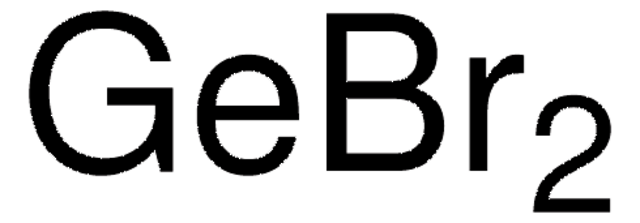215961
Tin(IV) bromide
99%
Synonym(s):
Tetrabromostannane, Tetrabromotin, Tin tetrabromide, Stannic bromide
Sign Into View Organizational & Contract Pricing
All Photos(1)
About This Item
Linear Formula:
SnBr4
CAS Number:
Molecular Weight:
438.33
EC Number:
MDL number:
UNSPSC Code:
12161600
PubChem Substance ID:
NACRES:
NA.22
Recommended Products
Quality Level
Assay
99%
form
solid
reaction suitability
core: tin
reagent type: catalyst
bp
202 °C (lit.)
mp
31 °C (lit.)
density
3.34 g/mL at 25 °C (lit.)
SMILES string
Br[Sn](Br)(Br)Br
InChI
1S/4BrH.Sn/h4*1H;/q;;;;+4/p-4
InChI key
LTSUHJWLSNQKIP-UHFFFAOYSA-J
Looking for similar products? Visit Product Comparison Guide
Related Categories
Signal Word
Danger
Hazard Statements
Precautionary Statements
Hazard Classifications
Skin Corr. 1B - STOT SE 3
Target Organs
Respiratory system
Supplementary Hazards
Storage Class Code
8B - Non-combustible corrosive hazardous materials
WGK
WGK 3
Flash Point(F)
Not applicable
Flash Point(C)
Not applicable
Personal Protective Equipment
dust mask type N95 (US), Eyeshields, Gloves
Choose from one of the most recent versions:
Already Own This Product?
Find documentation for the products that you have recently purchased in the Document Library.
Customers Also Viewed
Adam J Biacchi et al.
ACS nano, 12(10), 10045-10060 (2018-09-25)
Colloidal-based solution syntheses offer a scalable and cost-efficient means of producing 2D nanomaterials in high yield. While much progress has been made toward the controlled and tailorable synthesis of semiconductor nanocrystals in solution, it remains a substantial challenge to fully
Dongkun Yu et al.
The journal of physical chemistry. B, 123(23), 4958-4966 (2019-05-24)
The concept of eutectic molecular liquids (EMLs) was defined, and a strategy to form EMLs based on noncovalent interactions was proposed. We verified the formation and investigated the properties, interaction sites, and interaction energies of the obtained 16 EMLs. Moreover
Our team of scientists has experience in all areas of research including Life Science, Material Science, Chemical Synthesis, Chromatography, Analytical and many others.
Contact Technical Service











